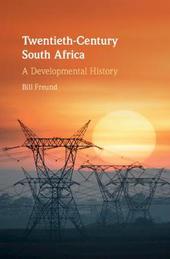
|
Twentieth-Century South Africa: A Developmental History
Paperback / softback
Main Details
| Title |
Twentieth-Century South Africa: A Developmental History
|
| Authors and Contributors |
By (author) Bill Freund
|
| Physical Properties |
| Format:Paperback / softback | | Pages:268 | | Dimensions(mm): Height 227,Width 152 |
|
| Category/Genre | African history |
|---|
| ISBN/Barcode |
9781108446150
|
| Classifications | Dewey:330.96805 |
|---|
| Audience | | Tertiary Education (US: College) | | Professional & Vocational | |
|---|
| Illustrations |
Worked examples or Exercises
|
|
Publishing Details |
| Publisher |
Cambridge University Press
|
| Imprint |
Cambridge University Press
|
| Publication Date |
25 October 2018 |
| Publication Country |
United Kingdom
|
Description
The twentieth century has brought considerable political, social, and economic change for South Africa. While many would choose to focus only on the issues of race, segregation, and apartheid, this book tries to capture another facet: its drive towards modernisation and industrialisation. While considering the achievements and failures of that drive, as well as how it related to ethnic and racial policy making, Bill Freund makes the economic data come alive by highlighting people and places. He proposes that South Africa in the twentieth century can actually be understood as a nascent developmental state, with economic development acting as a key motivating factor. As a unique history of South Africa in the twentieth century, this will appeal to anyone interested in a new interpretation of modern South African economic development or those in development studies searching for striking historical examples.
Author Biography
Bill Freund is Professor Emeritus of Built Environment and Development Studies at the University of KwaZulu-Natal, South Africa, and Visiting Professor at the University of Witwatersrand, South Africa. His previous books include The African Worker (Cambridge, 1988), The African City: A History (Cambridge, 2007) and The Making of Contemporary Africa (2016).
Reviews'Painstakingly researched, across detail and sweep of change, and authored by a leading scholar of African economic history, this volume is of profound significance not only for understanding the economic history of South Africa but also for the light shed on the contemporary unravelling in which the post-apartheid state finds itself.' Ben Fine, University of London 'Freund's latest title is an important landmark, showing the transformation of radical scholarship in recent years ... [his] is an important book that opens up new fields of urban research.' Timothy Gibbs, The English Historical Review
|